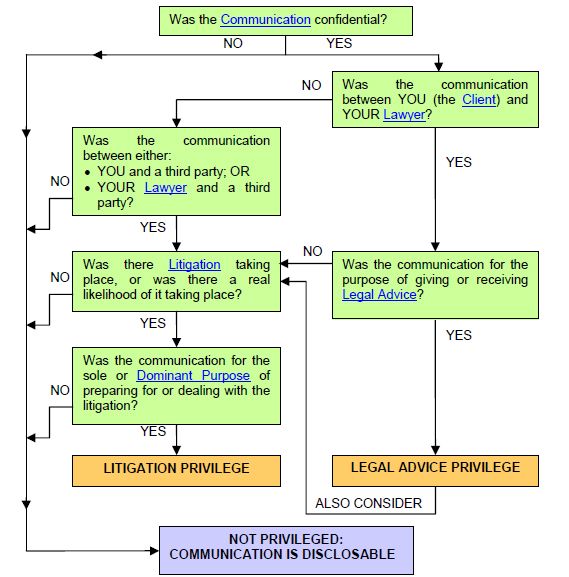Legal Professional Privilege
Privilege is a right, recognised under common law, which allows documents (or other forms of communication) to be withheld from disclosure during the course of litigation or certain investigations (such as those conducted by the European Commission).
The most common type of privilege is Legal Professional Privilege which can then be further divided into two sub-types:
- Legal Advice Privilege – protects confidential lawyer-client communications concerning legal advice
- Litigation Privilege – protects confidential communications made in preparation of litigation
The diagram below demonstrates how to determine whether an external communication is covered by one or both forms of legal professional privilege and therefore whether it should be disclosed.
Legal Professional Privilege: Is my External Communication Disclosable?

Internal Communications
- Employee creation of documents – Internal documents created by employees of the client in order to provide information to legal advisors will not be subject to legal advice privilege; however the communications may be covered by litigation privilege, providing the relevant test is satisfied.
- Dissemination of legal advice – A document attracting legal advice privilege that is then copied, repeated or referred to in internal documents will generally retain its privilege providing that the new document is produced for the purpose of communicating the advice so it can be used to reach a decision.
Retaining Privilege
Where only part of a communication is privileged (such as a single email within a chain) the privileged information may be redacted before the document is disclosed. Even where a communication is privileged, if it is subsequently disclosed then generally it will lose privilege unless one of the following can be established:
- Restricted waiver of privilege – Privilege can be retained against the rest of the world if a document is identified as privileged and shared with a party on confidential terms for a specific purpose, such as an audit.
- Joint interest privilege – Where multiple parties have instructed the same solicitor or have a joint interest in the subject matter of a privileged communication (such as a company and its shareholders, or trustees and the beneficiaries under the trust) these parties may share documents and still retain privilege against the rest of the world.
- Common interest privilege – Where parties giving and receiving disclosure share a common interest in the document or the litigation it was connected with (such as co-defendants or a principal and their agent), privilege may be retained against the rest of the world.
- Accidental disclosure – If a communication is mistakenly disclosed, the Court will decide whether or not it can be used by the receiving party, based on whether the privileged nature was obvious to the recipient (or should have been obvious to a reasonable solicitor).
Other types of privilege that should be considered:
- Privilege against self incrimination – Where there is a "real and appreciable" danger of a criminal charge or penalty being pursued against a person or their spouse, any communication which incriminates them is subject to privilege.
- Without Prejudice – This is a quasi-privilege which prevents communications made in a genuine attempt to settle a dispute from being used as an admission of fault in relation to a claim. This privilege relates to admissibility in Court rather than to disclosure of documents.
Glossary for Legal Professional Privilege Flowchart
- Client – For the purposes of legal advice privilege, this only includes those people who are specifically designated to obtain legal advice and does not necessarily include all individual members of an organisation.
- Communication – This includes emails, letters, attendance notes, voicemails and any other such records.
- Dominant purpose – A communication may have been created for multiple purposes, but the main objective in the document's creation must have been to assist in the litigation.
- Lawyer – This usually includes both external and in-house solicitors and barristers. However, legal advice given by in-house lawyers is not privileged in the context of a European Commission Competition Investigation, or where their advice is given in an executive or compliance capacity.
- Legal advice – Legal advice includes advice as to what should prudently and sensibly be done in the relevant legal context, however purely business advice will not be privileged.
- Litigation – Litigation in this context includes all adversarial proceedings such as arbitration and Court hearings, although the litigation must have either already commenced or the likelihood of it taking place must be more than a mere possibility.
The content of this article is intended to provide a general guide to the subject matter. Specialist advice should be sought about your specific circumstances.
